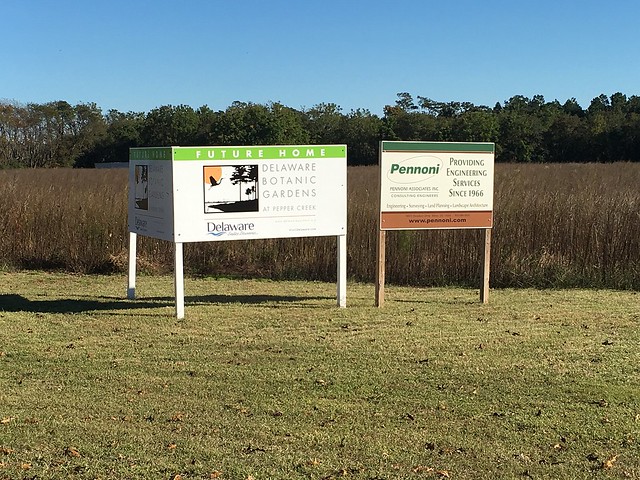
It may not look like much right now, but in Dagsboro, a small town in southern Delaware surrounded by farmland, there's a little plot of land that's causing a lot of excitement. This is the future site of the Delaware Botanic Gardens at Pepper Creek.
I first heard about plans for a new botanic garden in 2012, when it was still just an idea on paper dreamed up by a handful of people. I've vacationed in Rehoboth Beach for over 20 years and I've always thought the area needed a public garden of some kind, so I was delighted when I found out about this project and decided to support it in any way I could. Getting a tour of the site earlier this month was one of the highlights of the year for me.
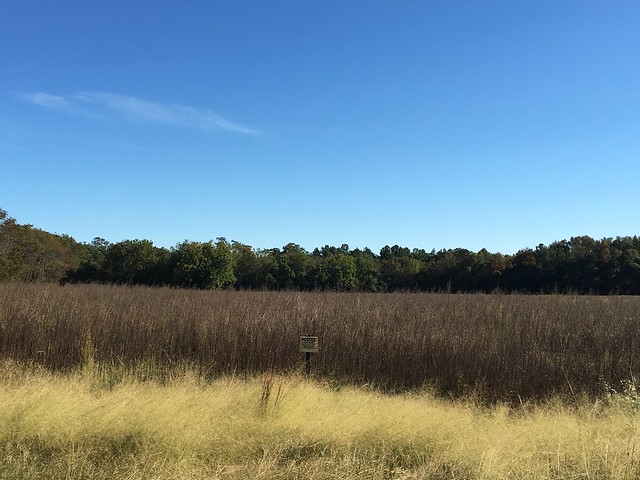
A blank slate: future site of the garden as seen from the road
A botanic garden in southern Delaware was the brainchild of Mike Zajic, former horticultural supervisor at Brookside Gardens in Wheaton, Maryland just outside Washington, DC. Mike assembled a board of directors, created Southern Delaware Botanic Gardens Inc., and he and his team established 501(c)(3) nonprofit status for the group, began to raise money, and scouted for a location. In 2013 the group found a 37 acre plot along Pepper Creek, a tributary of Indian River feeding into Indian River Bay, owned by the Sussex County Land Trust. The Sussex County Planning & Zoning Commission voted unanimously to approve the group's application and in 2014, the group signed a lease with the Land Trust. (I'm glossing over a lot of details here but my point is that the group worked fast, and they worked effectively.) The terms of the lease are very generous: one dollar a year for 99 years, and renewable of course! The board officially announced that the gardens had a location and a new name, and I was determined to visit.
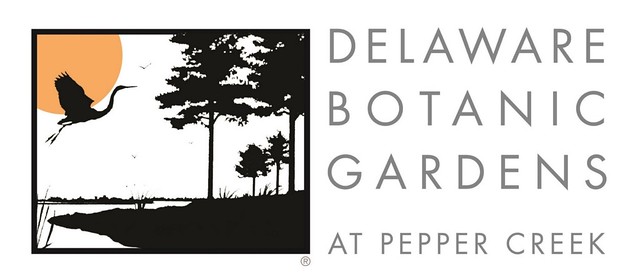
It was a beautiful early October day when I met Gregg Tepper, Director of Horticulture and board member, at a small restaurant in nearby Bethany Beach to talk about the Delaware Botanic Gardens at Pepper Creek (DBG). I knew Gregg through mutual friends and had previously asked if I might be able to see the site the next time my husband and I were in Rehoboth Beach. The long holiday weekend proved to be the perfect opportunity because Gregg was meeting up with several board and advisory council members to tour the site, and he invited me to come along. Over lunch he told me a bit about the history of the garden, his involvement with it, and his own background. Gregg was formerly the Director of Horticulture at Mt. Cuba Center, a botanic garden and preserve in northern Delaware near Wilmington. He's passionate about plants, he's passionate about this project, and he was excited to be showing it to me.
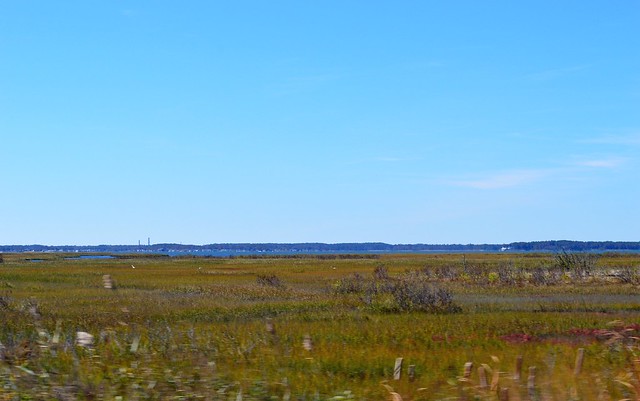
Pepper Creek in the distance
We drove through what was until recently a farm field, covering about 2/3 of the property, to the edge of the woods that are on the other third along the creek. The board members in addition to Gregg were Executive Director Sheryl Swed and Vice-president Ray Sander, along with Advisory Council members Rodney Robinson and Holly Shimizu. Rodney is a landscape architect and Holly is former director of the United States Botanic Garden in Washington, DC. Gregg had been hinting all through lunch that they had somebody big interested in the project and as we walked from the field into the woods, hushed conversations and nervous glances in my direction suggested that there was a purpose behind this visit. The news—after making sure I had been sworn to secrecy—was that internationally known landscape designer Piet Oudolf was to visit the garden the following week to consider taking on the DBG as a project.
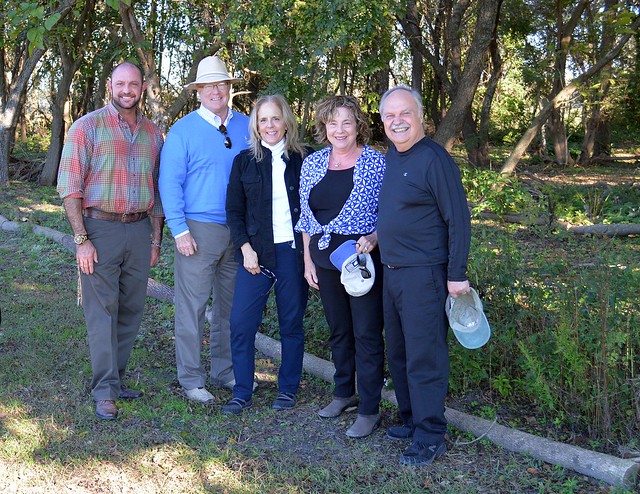
(l-r) Gregg Tepper, Director of Horticulture; Rodney Robinson, Advisory Council member; Holly Shimuzu, Advisory Council member; Sheryl Swed, Executive Director; Ray Sander, Vice-President
This was huge news; Piet is a horticultural rock star, known for his work on the High Line in New York among many, many other acclaimed projects. Gregg's friend, garden designer Barbara Katz (London Landscapes LLC), had contacted Piet about the possibility and put him in touch with the DBG board. Signing him onto the project would be a huge coup, would generate huge publicity for the garden, and would take things to the next level as a truly serious garden.
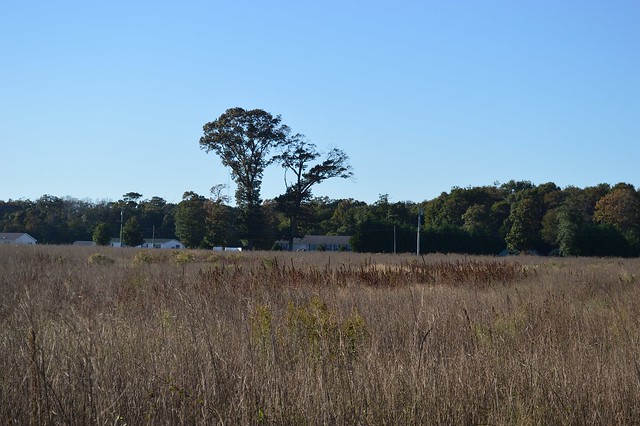
Former farm field, well on its way to meadow
Walking into the woods, Gregg and the board members discussed plans and possibilities, with Gregg pointing out some of the natives that were already growing on the site. Gregg stressed that this was to be a garden for the entire Delmarva Peninsula, not just Delaware; it would emphasize native plants but would also include non-invasive non-natives that are suitable to the mid-Atlantic coastal plain.

Humble beginnings: trail into the woods
Volunteers had cleared out some of the underbrush and made meandering trails down to the creek. The wooded area along the creek has apparently never been farmed and only minimally altered by human activity, although deer have cleared out a lot of the understory; a deer fence around the entire property will probably be a necessity.
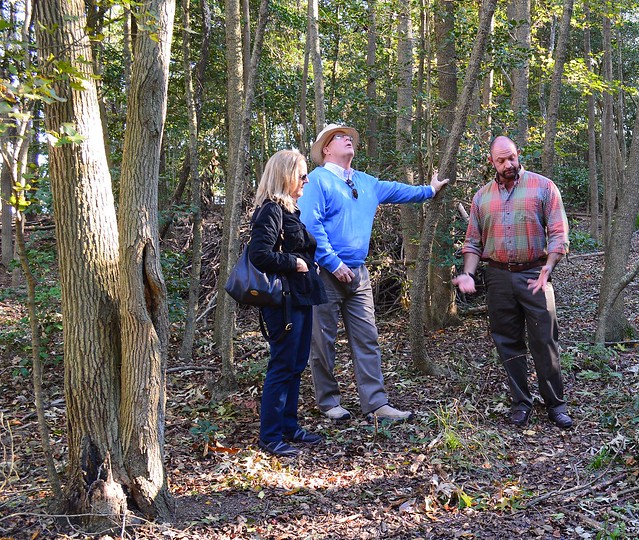
Examining the woods
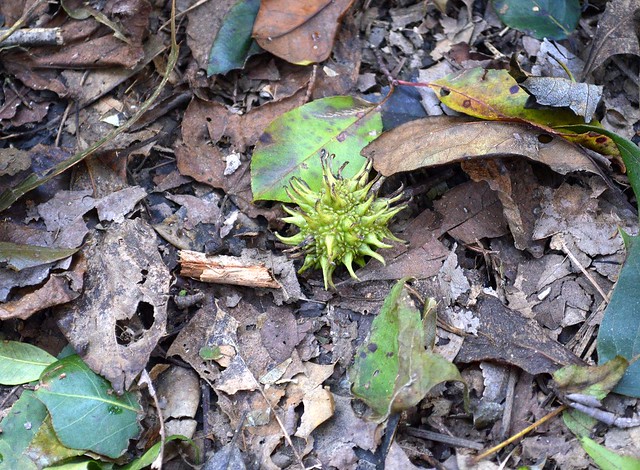
Sweet gum (Liquidambar styraciflua) fruit
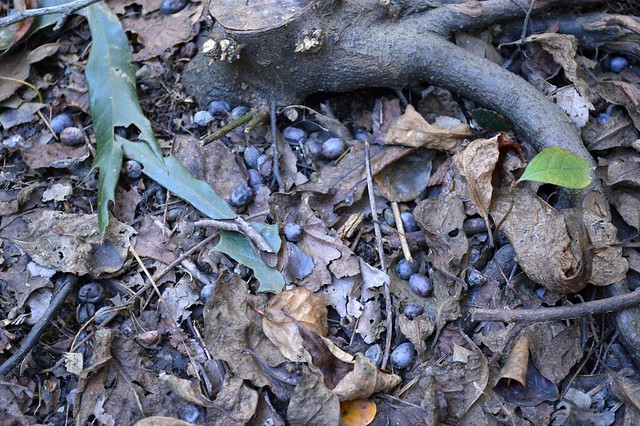
Black tupelo (Nyssa sylvatica) fruit
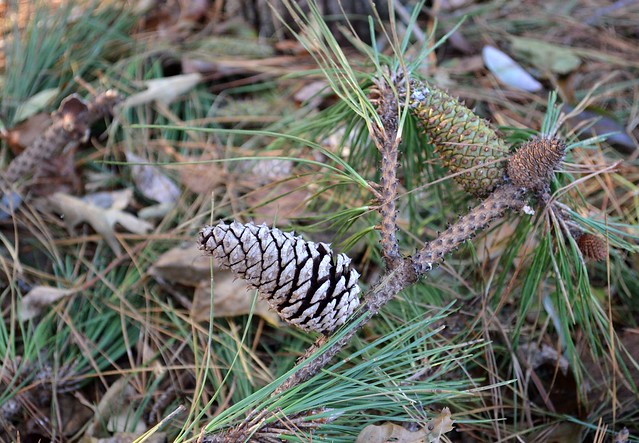
Loblolly pine (Pinus taeda) cone
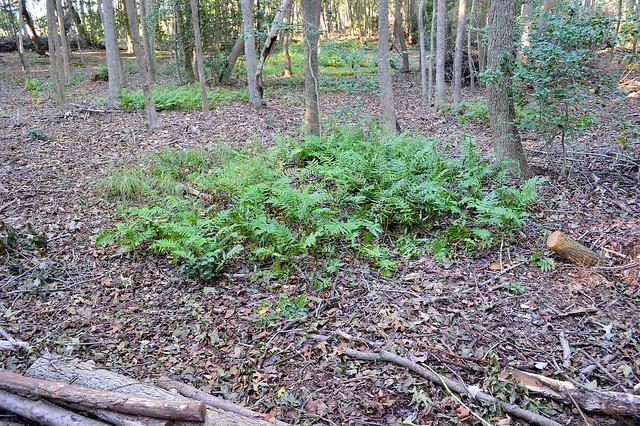
Netted chain fern (Woodwardia areolata)
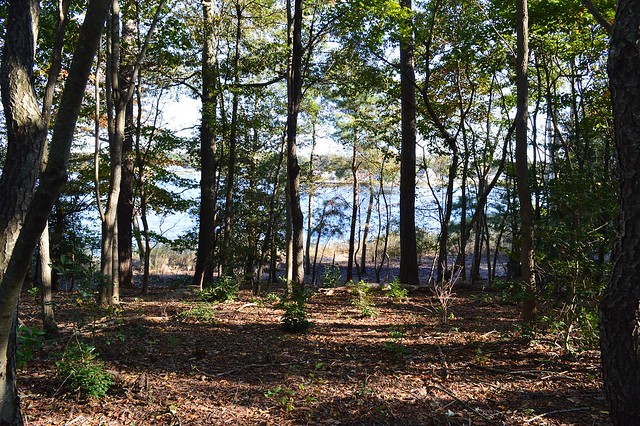
Approaching the creek
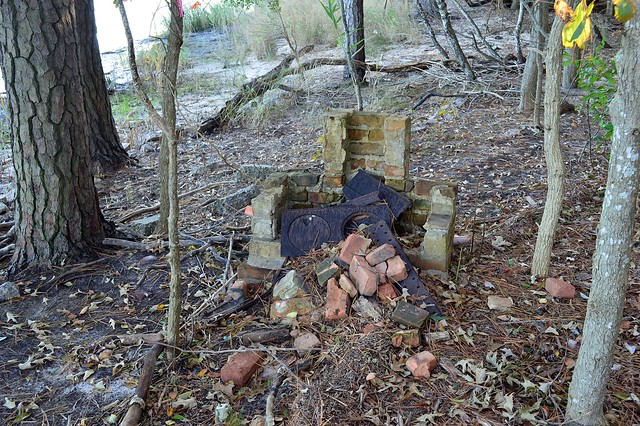
Evidence of human activity
We could catch glimpses of the creek through the trees and eventually emerged at the water's edge, where we paused to take in the view. Gregg pointed out a dead tree near the creek's edge that had had pileated woodpeckers nesting in it. The mix of meadow, woodland, and creekside habitats presents unique opportunities that not many botanic gardens have to work with.
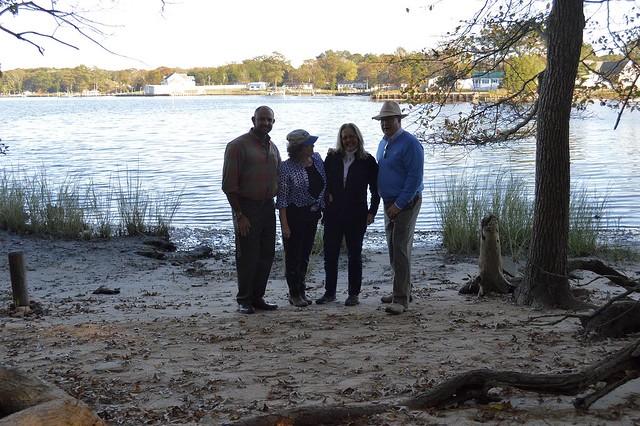
Creek's edge
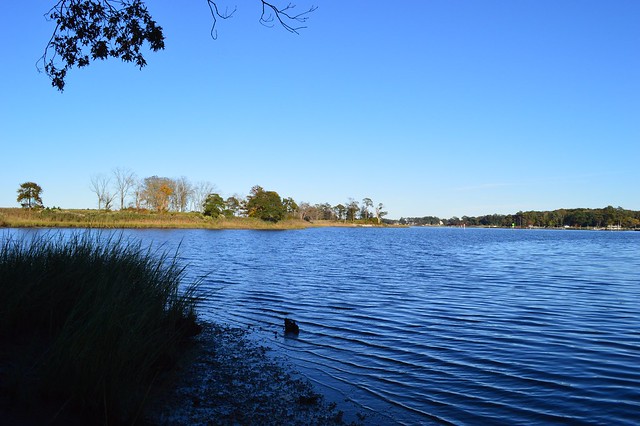
Pepper Creek
Unlike many public gardens like Longwood or Chanticleer that began as private estates, this one is starting from literally nothing. It's truly exciting to see such an ambitious, even visionary, project take shape from the very beginning, and I look forward to seeing the board's vision realized in a few short years.
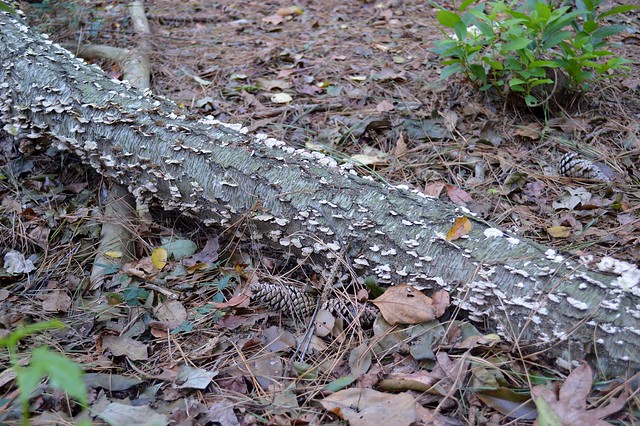
Fungus-covered log
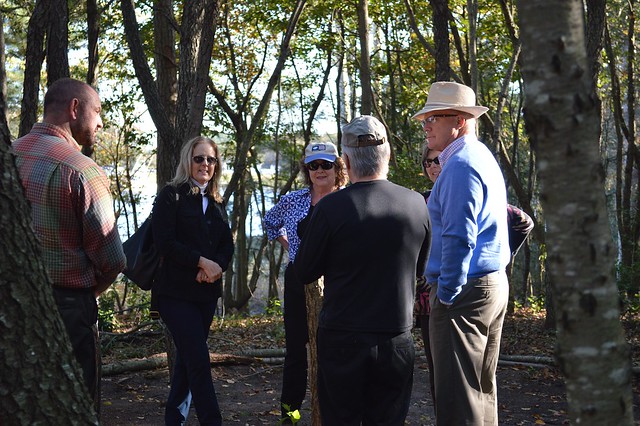
Discussing plans and possibilities
As we walked back to the field, conversation turned back to Piet Oudolf and dreams of a meadow garden. The field had last been farmed less than two years before, but was already filled with a natural-looking mix of natives and introduced weeds. Catching the low, late afternoon sun, even a common native like dog fennel (Eupatorium capillifolium) seemed to have magical possibilities. The meeting with Piet Oudolf must have gone well, because I've since learned that he has agreed to take on the project. I don't have to keep the secret any longer, and you can read about his visit in two articles in the Cape Gazette: Meadow priest Piet Oudolf joins botanic garden project and Piet Oudolf to create meadow design for Delaware Botanic Gardens.
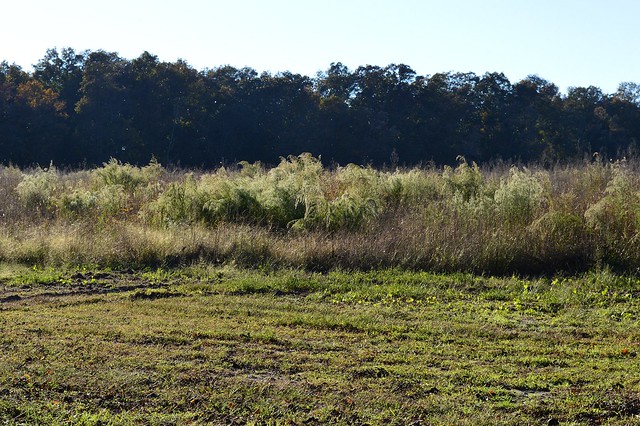
Meadow (for zoomable view click here)
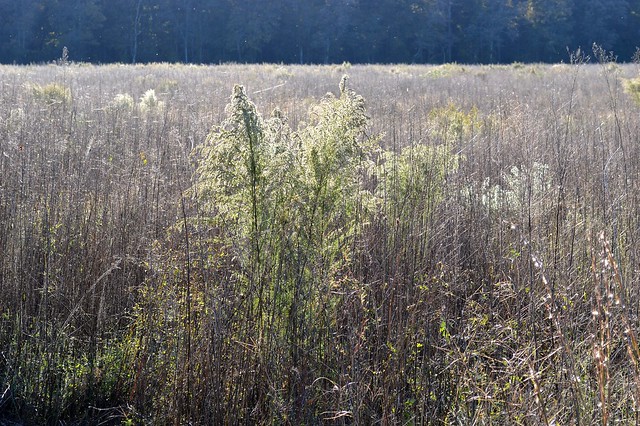
Dog fennel (Eupatorium capillifolium)
In addition to my own photos, below is a drone video taken by my husband (the chance to fly his drone being the carrot to get him to drive out there with me). The drone starts near the center of the property, flies over the property's woods to the creek, then turns around and views the entire site, with former farm field going all the way to the road. Below that is a still from the video that most clearly shows the site.
Drone video of the garden location
Still from video
Many, many thanks to Gregg Tepper and the board for allowing me to tag along on this visit. Click here for my full set of photos. For more information, or to make a tax-deductible donation, please visit the Delaware Botanic Gardens at Pepper Creek website. DBG also has a Facebook page.
Update: for another blogger's perspective, see this post by Susan Harris at Garden Rant: Delaware Botanic Garden and “Rock Star” Piet Oudolf

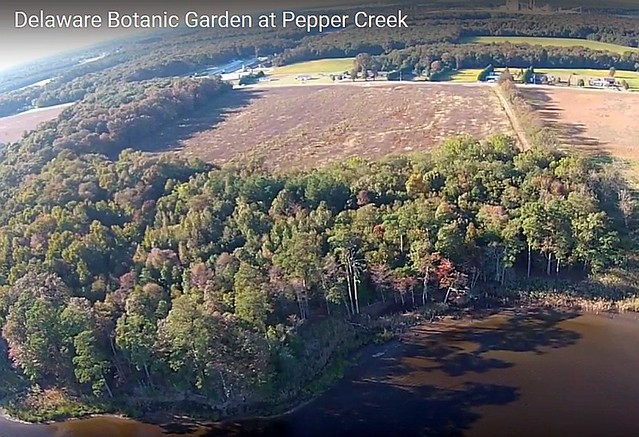
Thanks for sharing. This should be a fascinating project!
ReplyDeleteThis sounds a terrific project and really exciting - congratulations on having got it so far. I have a question though: although there is apparently a clear need for a public garden in the area, why have they chosen to create a 'Botanic' garden, with all the massive extra running costs that being 'Botanic' entails, as opposed to a 'just' a teaching garden? Everything they plant could be identical in a teaching garden, a public garden, a native garden - even with Piet Oudoulf - but being properly Botanic and keeping accession records, backup of specimens, seed distribution (even before any scientific research) means they will need three times the staff for the record keeping alone. Puzzled why they took this route. Is money never going to be an issue?
ReplyDelete